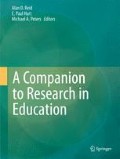Abstract
This chapter explores the marginal position and at times methodologically narrow focus of the discipline of education today. It suggests as a counterpoint that a much broader claim can be made for the significance and scope of education. Indeed, as the discipline which explores how humans come to know, and as the discipline deployed to initiate novices into every other discipline, education could make a claim – much as philosophy did until it slipped into practical irrelevance – that it is the discipline of disciplines, or metadiscipline. The chapter explores the implications of this move at a number of levels, from a strategic level in which education plays a pre-eminent role in the formation of ‘knowledge society’, to its implications for the pragmatics of pedagogy.
Access this chapter
Tax calculation will be finalised at checkout
Purchases are for personal use only
Notes
- 1.
This chapter reworks and extends ideas begun in our New Learning: Elements of a Science of Education, 2008.
- 2.
Our Learning by Design project is an attempt to frame these concepts in pedagogical practice. See L-by-D.com.
References
Blackburn S (2005) Truth: a guide. Oxford University Press, Oxford
Cazden CB (2006) Connected learning: “weaving” in classroom lessons. In: Pedagogy in practice 2006 conference, University of Newcastle, Newcastle
Chalmers AF (1976) What is this thing called science? University of Queensland Press, St Lucia
Cope B, Kalantzis M (eds) (2000) Multiliteracies: literacy learning and the design of social futures. Routledge, London
Cope B, Kalantzis M (2007) New media, new learning. Int J Learn 14(1):75–79
Cope B, Kalantzis M (2009a) ‘Multiliteracies’: new literacies, new learning. Pedagogies Int J 4:164–195
Cope B, Kalantzis M (2009b) Ubiquitous learning: an agenda for educational transformation. In: Cope B, Kalantzis M (eds) Ubiqutous learning. University of Illinois Press, Champaign, pp 3–14
Damasio AR (1994) Descartes’ error: emotion, reason and the human brain. Penguin Putnam, New York
Deacon TW (1997) The symbolic species: the co-evolution of language and the brain. W.W. Norton, New York
Donald M (2001) A mind so rare: the evolution of human consciousness. W.W. Norton, New York
Erikson F, Gutierrez K (2002) Culture, rigor and science in educational research. Educ Res 31(8):21–24
Goody J (1977) The domestication of the savage mind. Cambridge University Press, Cambridge
Husserl E (1970) The crisis of European sciences and transcendental phenomenology. Northwestern University Press, Evanston
Kalantzis M (2006) Changing subjectivities, new learning. Pedagogies Int J 1(1):7–12
Kalantzis M, Cope B (2005) Learning by design. Victorian Schools Innovation Commission, Melbourne
Kalantzis M, Cope B (2008) New learning: elements of a science of education. Cambridge University Press, Cambridge
Koch C (2004) The quest for consciousness: a neurobiological approach. Roberts and Company, Englewood
Luria AR (ed) (1976) Cognitive development: its cultural and social foundations. Harvard University Press, Cambridge
McGinn C (2004) Mindsight: image, dream meaning. Harvard University Press, Cambridge
Ong WJ (1982) Orality and literacy: the technologizing of the word. Methuen, London
Peters MA (2007) Knowledge economy, development and the future of higher education. Sense Publishers, Rotterdam
Popkewitz TS (2004) Is the National Research Council Committee’s report on scientific research in education scientific: on trusting the manifesto. Qual Inq 10(1):62–78
Rizvi F (2007) Internationalization of curriculum: a critical perspective. In: Mary H, Levy D, Thompson J (eds) Handbook of international education. Sage, London, pp 390–403
Shavelson RJ, Towne L (eds) (2002) Scientific research in education. National Academies Press, Washington, DC
Vygotsky L (1934/1986) Thought and language. MIT Press, Cambridge, MA
Vygotsky L (1962) Thought and language. MIT Press, Cambridge, MA
Vygotsky LS (1978) Mind in society: the development of higher psychological processes. Harvard University Press, Cambridge
Author information
Authors and Affiliations
Corresponding author
Editor information
Editors and Affiliations
Rights and permissions
Copyright information
© 2014 Springer Science+Business Media Dordrecht
About this chapter
Cite this chapter
Kalantzis, M., Cope, B. (2014). ‘Education Is the New Philosophy’, to Make a Metadisciplinary Claim for the Learning Sciences. In: Reid, A., Hart, E., Peters, M. (eds) A Companion to Research in Education. Springer, Dordrecht. https://doi.org/10.1007/978-94-007-6809-3_13
Download citation
DOI: https://doi.org/10.1007/978-94-007-6809-3_13
Published:
Publisher Name: Springer, Dordrecht
Print ISBN: 978-94-007-6808-6
Online ISBN: 978-94-007-6809-3
eBook Packages: Humanities, Social Sciences and LawEducation (R0)

